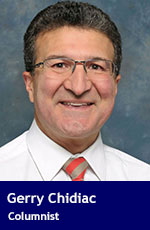 Jewish-American songwriter Bob Dylan tells us, “Patriotism is the last refuge to which a scoundrel clings.”
Jewish-American songwriter Bob Dylan tells us, “Patriotism is the last refuge to which a scoundrel clings.”
We put democracy in peril when we equate questioning government policy with being unpatriotic or even racist.
This is why the current situation in the United States is so puzzling. They actually established the international standard for good government and were emulated for hundreds of years as the model democratic state. They also proudly gave shelter to those fleeing oppression and seeking opportunity.
Freedom of speech, freedom of the press and academic freedom are core principles in the functioning of a democracy. Without them, we can’t have effective government and the risk of despotism becomes very real.
Yet today those who embrace these ideals are seen as anti-American. And those in desperate need of protection are told that there’s no room for them.
It was quite haunting to watch as American President Donald Trump spoke disparagingly of Ilhan Omar, the Congressional representative from Minnesota who fled Somalia as a child and is living proof that the American dream is still possible. Not only did the president describe her using words like “anti-Semitic” and “vicious,” the crowd joined in with his criticism by chanting, “Send her back!”
Anti-Semitism is very real and it’s not a word that should be used for political gain. Historically, it’s difficult to think of a more destructive thought. It’s a cruel and illogical concept that has caused centuries of suffering.
Israel is not a religion, a race or an ethnic group, it’s a state, just like Canada and the United States, and it is fallible. Just like any democracy, it needs to be held accountable by its electorate, and like any member of the United Nations, it needs to be held accountable to international human rights law.
Omar has spoken in favour of rights of Palestinians and has questioned the policies of the State of Israel. This doesn’t mean she is inherently anti-Semitic. Indeed her intentions are seen as sincere by many progressive Jews, who publicly declare, “I stand with Ilhan.”
Even the pro-Israeli media watchdog HonestReporting.com states that criticism of the State of Israel is not necessarily anti-Semitic. However, I found the site’s arguments as to what is and isn’t anti-Semitic rather vague.
This vagueness is terrifying to me as an educator. In my Social Justice 12 course, students research topics of their choosing. Would I have to tell a person interested in examining human rights in Israel that this is off limits because it could be seen as anti-Semitic? Could I even be putting my career at risk by allowing discussion on this topic in my classroom?
Fortunately, Israel is a democracy. Many of the strongest voices for Palestinian rights come from within Israel and from the Jewish diaspora.
Independent Jewish Voices Canada states in its mandate that, “No one should have to choose between embracing Judaism or Jewishness and supporting Palestinian rights.”
With over 200,000 supporters in the United States, Jewish Voice for Peace follows the long-standing Jewish tradition of working together for human rights, and supports an American foreign policy based on these ideals. The group clearly states that they oppose anti-Jewish, anti-Muslim and anti-Arab bigotry. They’re also the organizers of the “I stand with Ilhan” campaign.
Those of us who live in countries governed by legitimate democracies, whether in Canada, the United States, Israel or beyond, are among the most privileged citizens in the world. We can’t take these rights for granted.
When we oppose government policies, it’s not because we hate our countries, any groups or individuals. It’s because we’re grateful to those who sacrificed for the freedoms we now enjoy, and we accept responsibility for improving the lives of our neighbours and our descendants.
There’s no more profound expression of love for country and humanity than to actively work to make life better for everyone.
Troy Media columnist Gerry Chidiac is an award-winning high school teacher specializing in languages, genocide studies and work with at-risk students.
The views, opinions and positions expressed by columnists and contributors are the author’s alone. They do not inherently or expressly reflect the views, opinions and/or positions of our publication.


